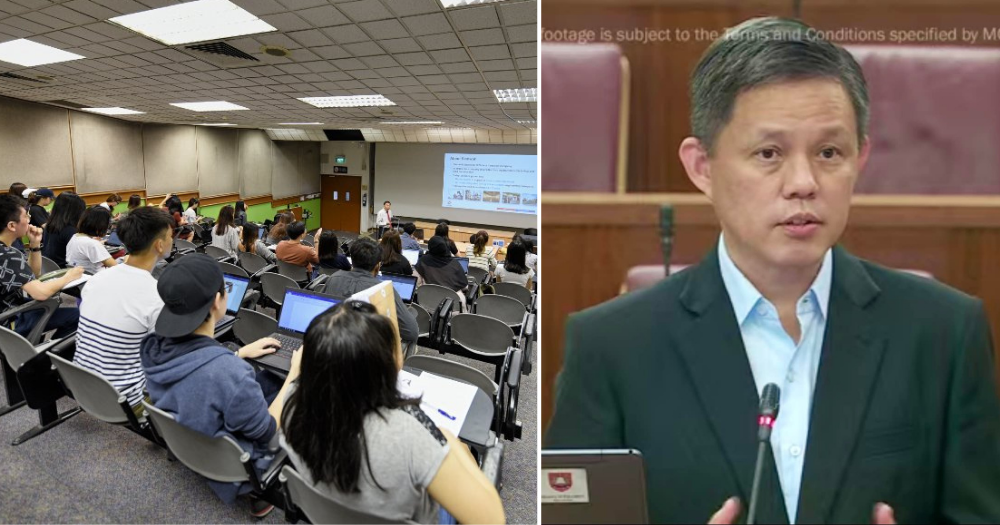Follow us on Telegram for the latest updates: https://t.me/mothershipsg
In his speech about the Singapore Green Plan during the Committee of Supply debate on Mar. 8, Minister for Education Chan Chun Sing elaborated on how educational institutions can play a key role in the country's push towards sustainability.
Chan described these institutions, which include Singapore's universities, polytechnics and the Institute of Technical Education, as well as their graduates, to be the "real needle movers" in the green transition.
Eco-stewardship toolkit
Chan first provided an update on sustainability efforts in schools, stating that the Ministry of Education (MOE) has been "making good progress" since the announcement of the Eco-Stewardship Programme (ESP) in 2021.
The ESP revolves around the four Cs — Curriculum, Campus, Culture and Community — and aims to nurture students from primary to pre-university levels to be environmental stewards for the future.
Aside from supporting teachers with resources on sustainability, Chan said that MOE is also developing an eco-stewardship toolkit to further support schools in strengthening their sustainability journey.
How can institutions help?
Chan went on to say that educational institutions play a critical role in Singapore's green transition.
As part of the Green Plan, these institutions have made sustainability "a strategic priority in their agendas".
Some autonomous universities for example, have developed master plans on their sustainability targets and initiatives.
To step up efforts to support sustainable living and the green economy, Chan highlighted two "needle moving" areas that institutions can contribute in.
Leveraging on R&D
The first is for institutions to leverage on their research and innovation capabilities to develop new products and services which are able to tackle sustainability challenges in other sectors.
These capabilities "position them well to advance Singapore's sustainability goals," Chan said.
Institutions such as polytechnics can work with industries on projects to reduce carbon emissions and support the green transformation in industries.
Chan drew attention to how Nanyang Polytechnic had launched a sustainability experience centre with Schneider Electric.
Through the centre, NYP staff and students will work with 100 Small and Medium Enterprises (SMEs) by 2023 to co-create and implement energy-efficient initiatives.
Autonomous universities are also using their campus as living laboratories to support national research and talent development efforts.
For instance, the Singapore University of Technology and Design (SUTD) will be transforming its campus in Changi into a green experimental ground.
This will allow SUTD faculty and students to partner the industry and the community to testbed new technologies and innovative projects on waste management and reducing electricity usage.
Preparing workforce for the green economy
Institutions also play an important role in equipping Singapore's graduates and workforce with the necessary skills and competencies to seize opportunities in the growing green economy, Chan said.
He noted that today, according to a report by SkillsFuture Singapore, over 450 job roles across 17 sectors require green skills.
As more of such jobs are to be expected, the government needs to invest in "green upskilling" for its workforce.
To meet this demand, institutions are thus refreshing their specialised course offerings and launching new programmes to equip Singaporeans with "forward-looking skills for emerging green jobs, or existing jobs that are going to be green".
Beyond equipping students to enter green jobs, Chan said MOE is also equipping the broader base of students with knowledge, competencies and skills related to sustainability.
Currently, almost all institutions include sustainability as a theme for their common curricula.
Institutions will also continue to work closely with industry partners to curate more internship opportunities which allow students to acquire and apply green skills and better prepare them for future green careers.
Additionally, for those already working in industries that are undergoing a green transition, education and training courses in areas such as green engineering solutions, green finance and environmental sciences for these workers will be ramped up.
A whole-of-nation effort
Chan concluded that MOE is fully committed to contribute to a sustainable Singapore under the Singapore Green Plan 2030.
He added:
However, Chan noted that it requires a "whole-of-nation effort to make sustainability our way of life"."Our schools will be a key foundational enabler for this journey, as they nurture the next generation of our students to be the stewards in environmental sustainability. Our institutions will play significant needle-moving roles by building up their capabilities and capacities in partnership with our industry."
Experts, educators, companies, community partners, and all Singaporeans are thus welcomed to join in this sustainability journey and endeavour.
Top photo from Samwoh and MCI / YouTube
If you like what you read, follow us on Facebook, Instagram, Twitter and Telegram to get the latest updates.

